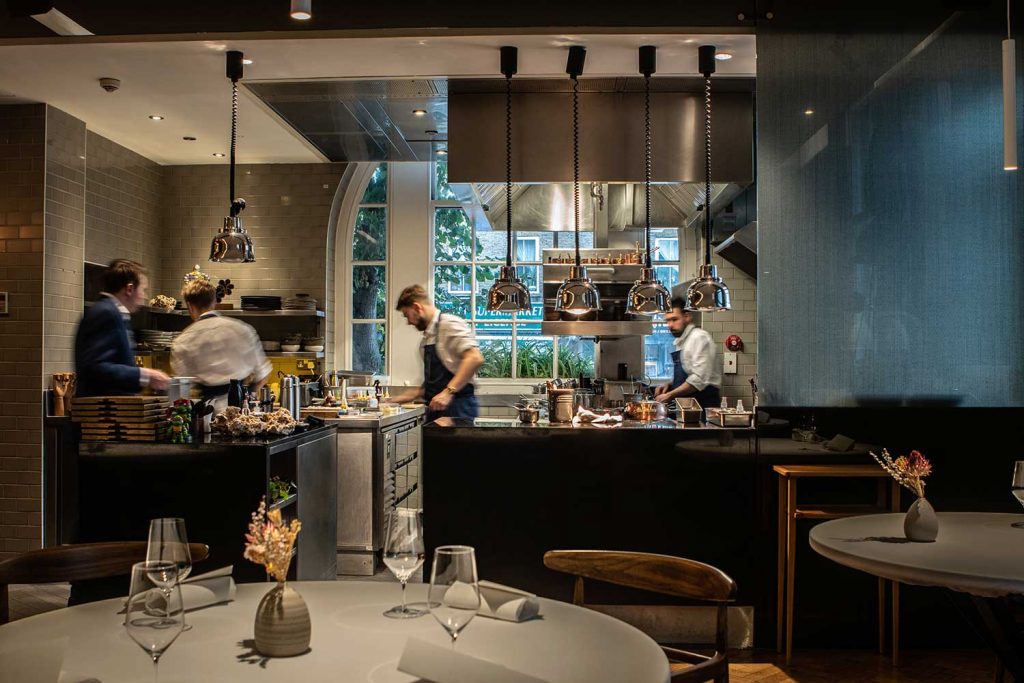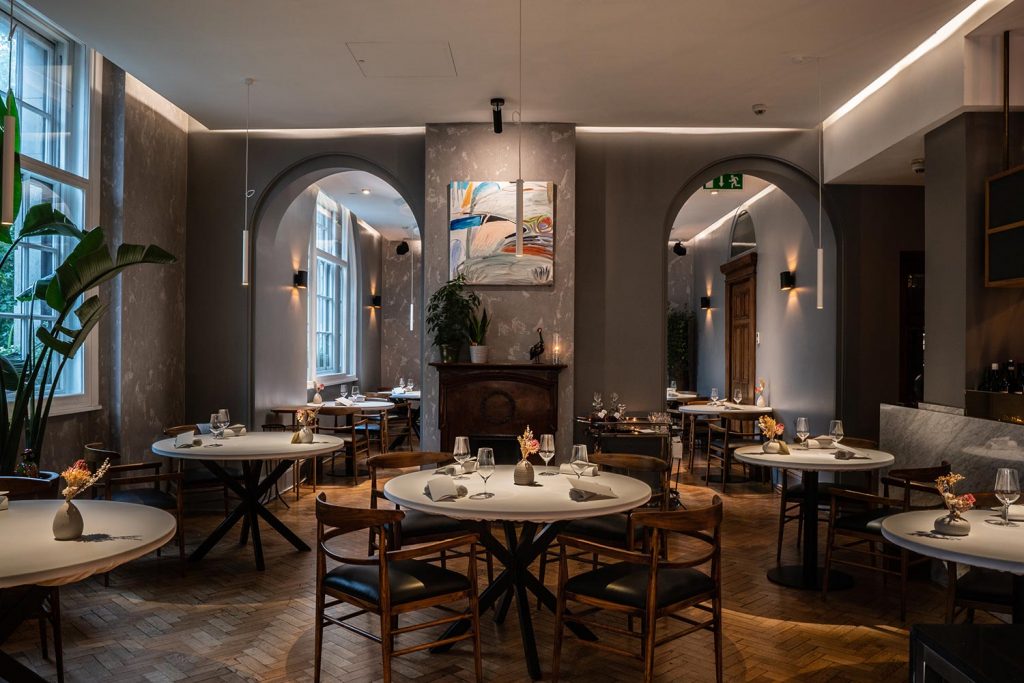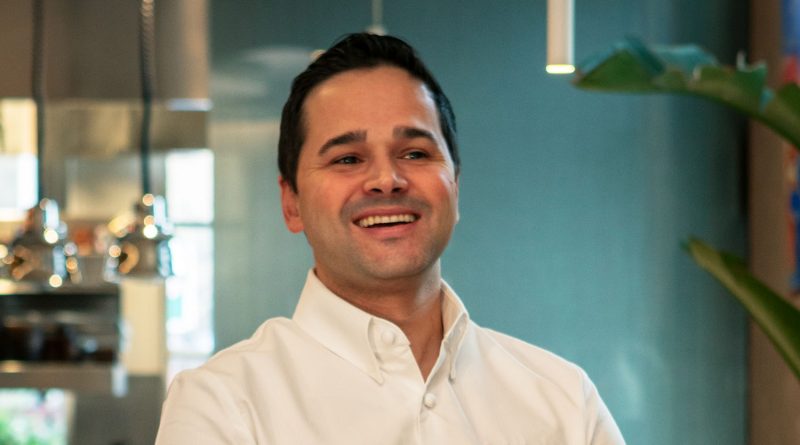De Terra’s chef Rafael Cagali: being Brazilian-Italian and gay in a hyper-masculine world
Rafael Cagali, head chef of Bethnal Green’s two Michelin Star restaurant Da Terra, on finding his passion for cooking and working in a hyper-masculine environment as a gay man.
For a chef whose culinary influences span Brazil to Berkshire, it seems fitting that Rafael Cagali would set up his first restaurant in London, a city where every culture and country’s food is represented.
Born in Sao Paolo, Cagali came to London after he’d just turned 20, initially looking to learn English and step outside of his comfort zone. He’d just quit his economics studies, not knowing that his move to the capital would be the first step in him discovering a lifelong career and passion for cooking.
The launch of Da Terra, and securing the Victorian building it resides in, was the result of fortunate circumstances. The restaurant space in the Town Hall Hotel became available around the time that Cagali was looking to branch out on his own for the first time. Although he initially didn’t know much about Bethnal Green, he explains that the more he explored the independent businesses the area is renowned for, the more it started to remind him of home. He said: ‘There’s no stiffness to it at all; there are some really lovely local shops and pubs and everyone I meet is friendly.’
When he first came to London, he only knew his friend’s sister and was living in a shared house with strangers: ‘I needed a job and so I started working in a kitchen and I discovered my passion for cooking. I didn’t have any experience, but hospitality is an industry where you can join at any stage and work your way up.’

Although Cagali’s mum worked in hospitality and he grew up around the industry, he never thought it would be something that he would do for the rest of his life. However, one of his early mentors noticed his talent and pushed him to hone his skills and study cooking. A stint at Westminster College later, and his career has seen him cooking at some of the UK’s most renowned restaurants including up-market Italian Daphne’s in Chelsea and Heston Blumenthal’s, The Fat Duck.
His culinary journey has also taken him to Italy, where he took the opportunity to explore his Italian heritage. From initially moving to Verona to immerse himself in the culture, he quickly learnt the language and how to cook incredible Italian cooking through his chef job at a restaurant in Lake Garda.
His Brazilian and Italian influences are weaved into the menu’s dishes; the former in their Moqueca, a Brazilian stew of wild halibut and farofa (toasted cassava), and the latter in the duck raviolo with whey and watercress.
How do you put together a tasting menu with at least nine courses? Cagali playfully explains that it’s, ‘like watching a baby grow up. You watch them take their first steps and their first words and gradually grow. The way a menu comes together is similar, where you gradually find your pace and take your time perfecting the dishes.’
Hospitality can be a notoriously demanding career, with long and unsociable hours a prerequisite. When asked about the lifestyle his chosen career affords, he is stoic about the commitment needed to be successful: ‘Personally, I have never felt overwhelmed with the hours. I knew this is what it would be like, and I made a conscious choice. I’m aware that some people might have their partners pressuring them to work less, but that hasn’t happened to me.’
Cagali’s partner, Charlie Lee, is the general manager of Da Terra so they share similar schedules and passion for the restaurant. They live together in Essex and fix their work commitments to ensure they get their days off together.
The culture of hospitality is notoriously hyper-masculine, with a common perception that kitchens aren’t overly welcoming for LGBTQ people. In his early roles, Cagali was too busy absorbing the culinary wisdom of his mentors and perfecting his craft to think about consciously coming out to his colleagues. He explains: ’I didn’t even have a classic “coming out” to my parents so I didn’t feel that it mattered at work. I also didn’t want anyone to treat me differently and for my sexuality to impact work.’
Although he’s never experienced workplace bullying, there have been instances where colleagues who weren’t aware of his sexuality have made hurtful comments. He said: ‘I’ve developed a tough skin and I know that I’m not going to change everyone’s mind. These kinds of views are generational and are fortunately now quite rare.’
He describes the De Terra kitchen culture as ‘respectful’ and free of any big egos present in the stereotypical view of a kitchen headed up by a shouty, Gordon Ramsey-type. He’s also now more direct when addressing comments about his sexuality: ‘Sometimes diners will ask if I have a wife and kids and I tell them straight away that I have a husband and a dog.’

When asked if there was anything he would change about the restaurant industry, he needs time to think. After a beat, he explains that he would like the public’s understanding of the value of the industry to change. He said: ‘I would love to make people appreciate hospitality as a future career, equally valued as any other top career such as banking. People who work in hospitality bring so much passion, love and care to their work and their work should be appreciated much more.’
Cagali explains that the response to the restaurant has been overwhelmingly positive, but that one of the highlights of De Terra’s relatively short history is being awarded two Michelin stars in as many years: ‘I can’t describe the feeling of winning a Michelin Star. It was incredible and showed us that all of our hard work was recognised and had paid off.’
With plans to develop the restaurant over the next six months, and Cagali’s commitment to refining and improving Da Terra’s menu, maybe a third Michelin star is right around the corner.
If you enjoyed this, you may enjoying reading about the artist Milou Stella on being queer theory.

